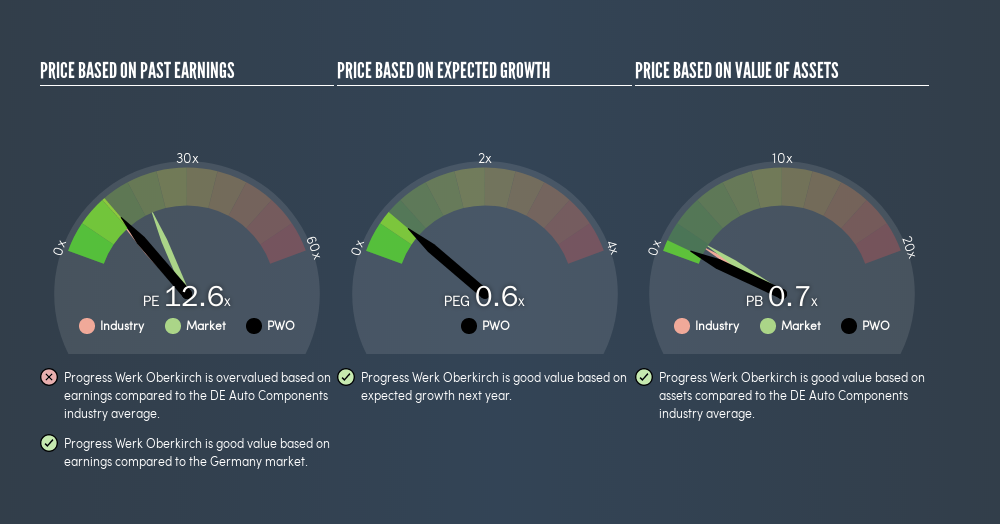
This article is for investors who would like to improve their understanding of price to earnings ratios (P/E ratios). We'll look at Progress Werk Oberkirch AG's (FRA:PWO) P/E ratio and reflect on what it tells us about the company's share price. Progress Werk Oberkirch has a price to earnings ratio of 12.56, based on the last twelve months. That means that at current prices, buyers pay €12.56 for every €1 in trailing yearly profits.
View our latest analysis for Progress Werk Oberkirch
How Do I Calculate A Price To Earnings Ratio?
The formula for P/E is:
Price to Earnings Ratio = Price per Share ÷ Earnings per Share (EPS)
Or for Progress Werk Oberkirch:
P/E of 12.56 = €26.8 ÷ €2.13 (Based on the trailing twelve months to December 2018.)
Is A High P/E Ratio Good?
A higher P/E ratio means that buyers have to pay a higher price for each €1 the company has earned over the last year. That isn't a good or a bad thing on its own, but a high P/E means that buyers have a higher opinion of the business's prospects, relative to stocks with a lower P/E.
How Growth Rates Impact P/E Ratios
When earnings fall, the 'E' decreases, over time. Therefore, even if you pay a low multiple of earnings now, that multiple will become higher in the future. Then, a higher P/E might scare off shareholders, pushing the share price down.
Progress Werk Oberkirch's earnings per share fell by 34% in the last twelve months. And over the longer term (5 years) earnings per share have decreased 13% annually. This might lead to muted expectations.
How Does Progress Werk Oberkirch's P/E Ratio Compare To Its Peers?
The P/E ratio indicates whether the market has higher or lower expectations of a company. As you can see below, Progress Werk Oberkirch has a higher P/E than the average company (11.6) in the auto components industry.

Its relatively high P/E ratio indicates that Progress Werk Oberkirch shareholders think it will perform better than other companies in its industry classification. Shareholders are clearly optimistic, but the future is always uncertain. So investors should delve deeper. I like to check if company insiders have been buying or selling.
A Limitation: P/E Ratios Ignore Debt and Cash In The Bank
One drawback of using a P/E ratio is that it considers market capitalization, but not the balance sheet. So it won't reflect the advantage of cash, or disadvantage of debt. In theory, a company can lower its future P/E ratio by using cash or debt to invest in growth.
Such expenditure might be good or bad, in the long term, but the point here is that the balance sheet is not reflected by this ratio.
So What Does Progress Werk Oberkirch's Balance Sheet Tell Us?
Net debt totals a substantial 157% of Progress Werk Oberkirch's market cap. This level of debt justifies a relatively low P/E, so remain cognizant of the debt, if you're comparing it to other stocks.
The Bottom Line On Progress Werk Oberkirch's P/E Ratio
Progress Werk Oberkirch's P/E is 12.6 which is below average (20.4) in the DE market. When you consider that the company has significant debt, and didn't grow EPS last year, it isn't surprising that the market has muted expectations.
Investors should be looking to buy stocks that the market is wrong about. If the reality for a company is not as bad as the P/E ratio indicates, then the share price should increase as the market realizes this. So this freevisual report on analyst forecasts could hold the key to an excellent investment decision.
You might be able to find a better buy than Progress Werk Oberkirch. If you want a selection of possible winners, check out this freelist of interesting companies that trade on a P/E below 20 (but have proven they can grow earnings).
We aim to bring you long-term focused research analysis driven by fundamental data. Note that our analysis may not factor in the latest price-sensitive company announcements or qualitative material.
If you spot an error that warrants correction, please contact the editor at editorial-team@simplywallst.com. This article by Simply Wall St is general in nature. It does not constitute a recommendation to buy or sell any stock, and does not take account of your objectives, or your financial situation. Simply Wall St has no position in the stocks mentioned. Thank you for reading.
About DB:PWO
PWO
Develops, produces, and sells metal components and systems for the mobility industry in Germany, Czechia, Canada, Mexico, Serbia, and China.
Established dividend payer and good value.
Market Insights
Community Narratives



